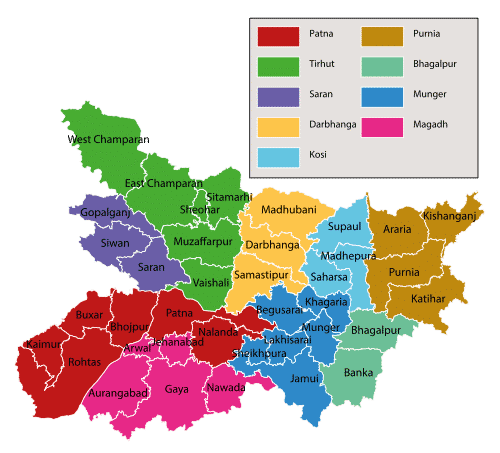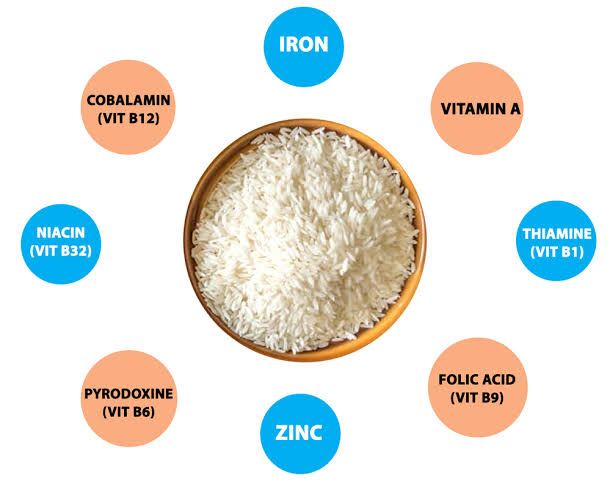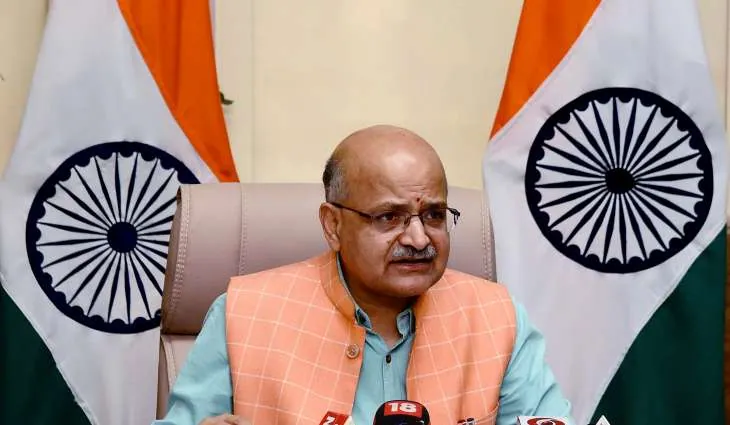Before understanding the farm laws, first know about the APMC system
- Under the APMC Act, the states can establish agricultural markets, popularly known as mandis.
- The sale of agricultural commodities can occur only in the mandis through auction.
- The sales process in mandis is regulated through commission agents (CAs) who mediate between the farmers and traders.
If the middlemen try to trick the farmer by quoting low rates, the farmer can also sell his produce to the State, through procurement agencies like the Food Corporation of India (FCI). These agencies are required by law to purchase from the farmer at a Minimum Support Price (MSP).
Some info about MSP :
- The MSP is a mechanism wherein the Government announces (at the beginning of the sowing season) the minimum price at which it will buy a farmer’s harvest.
- Fixing MSPs is seen as necessary to protect farmers from price fluctuations and give them an upper hand in mandi negotiations.
- Government of India announces MSP(for 22 crops before their sowing seasons) on the recommendations of the Commission for Agricultural Costs and Prices, the Department of Agriculture and Co-operation.
Problems with the APMC regulated markets:
- Exploitation by Commission Agents : The licensing of commission agents in the state regulated markets has led to the monopoly of licensed traders.
- Lower price realisation : deduction of commission charges and market cess from the price discovered through auctions. Many farmers are clueless about the amount deducted from them; the estimates provided ranged from 5-20% of the auction price. Such deductions result in lower price realisation for farmers.
- Lack of transparency in the trading process,
- Collusion among traders,
- Price cartelisation : Formation of cartels with links to caste and political networks resulting in price variations.
- Delay in payments and low quality of mandi infrastructure.
- No exporters or processor buy directly from farmers. It discouraged processing and exporting of agricultural products.
- Under the act, the state government could only setup markets and investing in marketing infrastructure.
- An increased number of middlemen formed a virtual barrier between the farmer and the consumer.
So to remove all the above obstacles government brought these three farm laws –
- The Farmers’ Produce Trade And Commerce (Promotion And Facilitation) Act, 2020
- The Farmers (Empowerment and Protection) Agreement on Price Assurance and Farm Services Act,2020 and
- The Essential Commodities (Amendment) Act,2020
The Farmers Produce Trade and Commerce (Promotion and Facilitation) Act, 2020 •
What This Does
This bill essentially enables buyers to purchase produce outside designated mandis. How?
- It redefines “trade area”, dramatically expanding the places where farmer-buyer transactions can take place.
- It also redefines “trader” aka the middleman. Earlier, only State APMC-designated middlemen – the “commission agents” or the “arhatiyas” – could purchase crops from farmers. Now, anyone with a PAN card can become a trader.
- The act also stipulates that “no market fee or cess or levy” shall be levied on farmers or traders in trade areas.
- In APMC system, the delay in payments to the farmers ranges from three to fifty days. Therefore, the inclusion of the provision in the new farm Act that the payments to the farmers have to be made by traders within a maximum of three working days assumes importance.
What Critics Say
If farmers sell their produce outside APMC markets, States will lose mandi fees. This also takes the mandi-designated middlemen out of the picture (this is a major reason why the opposition has been particularly strong in Punjab and Haryana – these states have a robust and well-established arhatiya system). Levies on mandi transactions tend to be around 8.5%, and this includes the state’s charges (3%), the middlemen commission (2.5%) and a “rural development charge” (3%).
But the major problem is that with time it may affect the MSP system because there is a big example of this is in Bihar where after ending the APMC act in 2006, government was not able to procure the 1% of total produce of farmers at MSP.
Furthermore, by bringing in more potential buyers, the changes may weaken the prevailing MSP system and favour “big farmers” and big corporates at the expense of smaller producers.
What the Centre Says
- The changes give the farmer more choice in where he can sell and who he can sell to.
- By eliminating the market fee structures in different state APMCs, the Government contends the cost of transactions will reduce, and that this will benefit both the farmer and the trader.
- Also, by ending the mandi-limited constrictions, electronic trading is expected to experience a boost.
- The traders and Commission Agents dominate the pricing decision as they have monopolistic power and political backing. The Act addresses this issue in two ways. First, by allowing the farmers to sell outside the mandi system and Second, the Act has mandated the government to develop “a price information and market intelligence system for farmers’ produce” and disseminate it to them.
- The government has already initiated a plan to set up a portal and disseminate the price information through various channels such as mobile applications, text messages and electronic displays in mandis. This initiative would help farmers make an informed decision while selling their produce. Presently, farmers access price information through a homogeneous and closed information network, namely Commission Agents, mandi officials, friends and relatives.
The Farmers (Empowerment and Protection) Agreement on Price Assurance and Farm Services Act, 2020
What This Does
This act facilitates “contract farming”, which is when farmers enter into direct contracts with those who wish to buy farm produce, doing away with the middlemen – State APMC-appointed or otherwise – altogether.
So, this can be a deal between a farmer and a small restaurant chain that needs a constant supply of tomatoes and mushrooms, or between a farmer and a big company like Coca-Cola, which may require a regular supply of certain fruits for its fruit drink products.
What Critics Say
– In a contract farming arrangement, the farmer will always be the weaker party both during deal-making and in dispute resolution.
What the Centre Says
– By enabling farmers to enter into contracts with individual businesses directly, middlemen costs are done away with, leaving more money for the producer.
– The risk of market unpredictability, environmental variations, price fluctuations etc. Would be transferred from the farmer to the sponsor.
– And if a buyer is in direct contact with the farmer, he may be more inclined to help the latter invest in modern technological tools and apparatus to boost and improve his harvest.
The Essential Commodities (Amendment) Act, 2020
What This Does
– Deregulates the production, storage and sale of several food items including cereals, pulses, edible oils and onions, except in the case of extraordinary circumstances.
– Under the new rules, stockpiling limits can only be imposed only if retail prices surge 50% above the average in the case of non-perishables and 100% in the case of perishables.
What Critics Say
– This effectively legalises hoarding, which can be disastrous for the prices of critical items like vegetables and pulses.
– Here too, large corporates are better equipped to hoard and stockpile since they have better storage facilities, unlike the average farmer.
What the Centre Says
– The changes with usher in FDI and private-sector money, which can be used to set up cold storages and modernise food infrastructure.
– It will also deregulate the farm industry, decrease Government interference, and cut wastage of produce.
Some Doubts Related to These Three Farm Laws :
If farm produce is sold outside APMC mandis, these will stop functioning?
Mandis will not stop functioning, trading will continue here as before. Under the new system, farmers will have the option to sell their produce at other places in addition to the mandis.
Will Procurement at Minimum Support Price stop? If not then why farmers are protesting?
Procurement at Minimum Support Price will continue, farmers can sell their produce at MSP rates. Farmers are protesting mainly due to two reasons one is bypassing of APMC which may affect the MSP system in the future because there is no mention about MSP in the bill and hence no guarantee that it will continue and the other is there is no provision in the bill to regulate the private sector. so they have the fear that in the start they may get the good price but with time these private players will exploit them by not giving the proper price of their produce.
What will be the future of government electronic trading portal like e-NAM?
The e-NAM trading system will also continue in the mandis. Trading in farm produce will increase on electronic platforms. It will result in greater transparency and time saving.
Is contract farming happening first time in India?
No, Contract farming already existing but now individual farmers can directly do contract with the private companies.
But private companies would probably not deal with farmers directly, considering their requirement won’t fit with the marginal holding of a single farmer. Then middlemen again came into the picture.
If everything is fine then why these huge protests?
Protests are not happening everywhere. Its mainly concentrated in Punjab and Haryana where APMC system are well established. Licensed commission agents are protesting for their commission while farmers have fear of MSP as well as fear from big corporates.
In Bihar State government ended APMC act in 2006. But still there is no major investment by the Private players in Bihar. Inadequate market facilities and institutional arrangements are also responsible for low price realisation and instability in prices.
So, it is not the case that you give the free hand to the farmers to sell anywhere and they are getting good prices. Government have to be careful and monitor the situation if needed then make the laws to regulate private players from exploiting the marginal farmers.
Way Forward
The farmers were apprehensive about a new system of trade on various grounds. They include future of MSP, increased dependence on corporates, reduced government involvement in agriculture, land grabbing and exploitation by firms, and exit of corporates if the market conditions are unfavourable . These concerns need to be addressed by the government by including suitable safeguard provisions in the Act.
Also refer :
- Download the pdf of Important MCQs From the History Of Ancient India
- List Of Important Inscriptions In India
- Geography Study Materials : click here.








